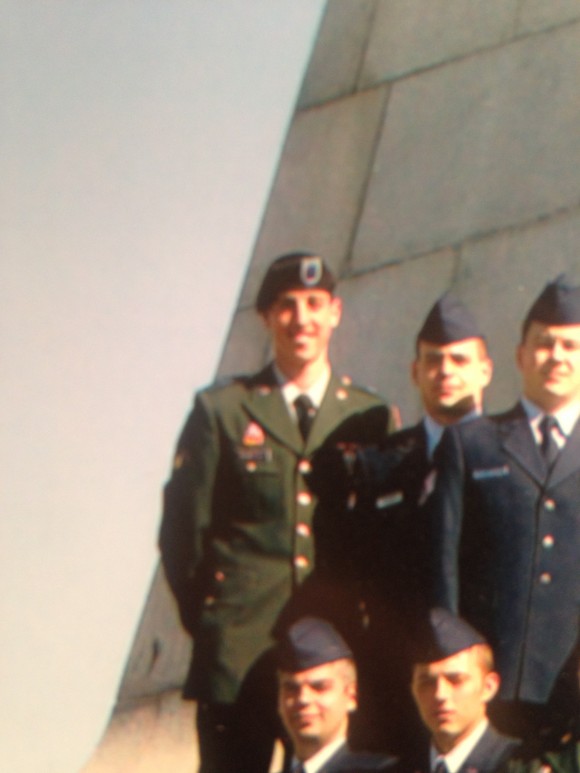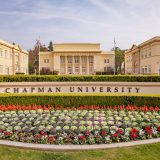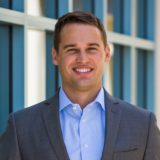Mike Nemerouf’s Journey From The Army To Chapman University The Math Major discusses his time overseas and how his work as an interrogator informed his decision to come to Chapman.
November 11, 2015
If you ran into Mike Nemerouf on campus, you’d likely remember him. He’s tall, a bit older than your standard undergraduate student, and a genuinely warm presence. His positivity and embrace of life are pretty apparent right off the bat, but his story of coming from nine years in the Army into Chapman for math and data sciences is inspiring. After a summer of getting married and moving back to Southern California, Mike sat down to discuss what he learned overseas and how his experience at Chapman has been.
Q: So you’re from Southern California?
A: I am, Whittier. And then when I was 18 I moved out, got my own place and did some odd jobs eventually decided to go into the military.
 Q: So what was that decision like?
Q: So what was that decision like?
A: Well part of the reason I decided to join the military was that I came from a pretty privileged background. Our money issues were nothing compared to what other people could go through and I didn’t really have to work too hard for anything. So I was feeling spoiled, and feeling like I needed a challenge and something that was going to give me some discipline and a reality check.
Q: And Uncle Sam was the guy?
A: And Uncle Sam was the guy. And so I walked in and I didn’t know what branch I was going to go with. Navy? I didn’t think so because I wasn’t ready to spend months or years on a boat, and so I went with the Army. I deployed and spent three years in Afghanistan and one years in Iraq. I did some of it as a Department of Defense Civilian and that was from ‘07-‘08 and ‘08-‘09 and from 2010 until early 2013. And I got really good scores and they said I qualified for any jobs I wanted that were open. And the one I want was titled “Counter Intelligence Agent” because it sounded cool *laughs* but I’m glad I didn’t take that because it turns out you focus on a lot of internal investigations. But they said they had this Human Intelligence Collector position open so I ended up getting into that. I got a language with it. They taught me Arabic.
Q: How’s your Arabic these days?
A: It’s still pretty good. It’s not where it was, I don’t get to practice very often, but it’s still solid. I could get around still, if I needed to.
Q: What was that culture shock like?
A: It was nuts. It drastically changed my perspective on people. For me, I was mostly working within the compound walls so I was surrounded by Americans, and they did a good job instituting the military culture stateside, so when you get over there you keep it. So that obnoxious American stereotype that we get when we’re abroad traveling ends up being a pretty good survival mechanism just to keep you sane without going through too much culture shock. They promote that.
To be honest, the biggest culture shock came when transitioning out of the military. And to call it a “transition” makes it seem a lot smoother than it was. I would call transitioning out of the military as smooth as transitioning from 5th gear to 2nd gear. It is abrupt and gives rise to lots of issues that many veterans are not prepared for. I was lucky because I had a great support system, but to go from the structure, comfort and consistency of military life to the unstructured chaos that is normal civilian life is challenging. In fact, many veterans cannot cope with the “transition” and find themselves not able to integrate back into society. It is one of the reasons why so many veterans end up homeless.
A friend of mine, Justin Groza, who is a combat veteran himself is actually in the process of launching his company LOGOS whose sole mission is to end veteran homelessness which is something I’ve been pretty passionate about after leaving. He has a very unique business model that goes far beyond throwing money at the issue. His business aims to lay down a clear path for homeless veterans to get back to being productive members of society. I encourage anyone who is interested in helping combat veteran homelessness to check out his indiegogo campaign. Anyway, back to the interview.
Q: So then how did you get to Chapman?
A: I got done in 2013 and knew I wanted to get into school. I initially wanted to do an MBA, economics undergrad and maybe a masters in business administration and that was at UT Austin. I had a great time in Austin, but I took a class called Management of Information Systems and that’s when I heard about data science for the first time. I think I’d heard of Big Data here and there, but I didn’t know what they were actually talking about. And I realized a lot of my time spent in Iraq and Afghanistan was (a lack of data tracking). One of the biggest keys to success as an interrogator is information dominance and having knowledge. If your detainee thinks you know everything, from the makes and models of all the cars they’ve ever owned over the last ten years to whatever their favorite soda is, they think you know everything so they don’t know what information they can leave out. A big key to success is doing your research on the front-end. Kind of like doing an interview, doing good research allows you to be successful on the back-end.
So I found myself going through a lot of intelligence reports, and by the time I got there (the U.S.) had been in Afghanistan for almost 10 years, which means there was probably a report on everyone in the country. And we would get back and analysts would say sorry, there’s no reporting on this guy. And I knew that was impossible so I would get into looking and manually I would have to read and visually scan literally report after report after report- and as a human, I would make connections that the computer couldn’t.
Q: And meanwhile you knew there was a better way to be doing this via a computer.
A: Right! And I didn’t even know there were things happening with machine learning that would have given intuition to a computer which would have drastically improved reporting and intelligence production at the location I was.
Q: So was that part of your thought process into pursuing math and computational data and sciences?
A: It shifted me out of economics and I wanted to do data science, and based on my educational background I thought a math undergrad degree would be my best path forward. The reason I ended up choosing to come to Chapman was because I was chasing a girl. I started dating my wife while I was still in Texas and while she was living in Southern California. As things got more serious, I knew I needed to be closer to her so I looked for data science programs at California universities. Of all the programs available in Southern California, Chapman’s seemed the most interesting and comprehensive. So over the summer I got accepted at Chapman, my wife and I got married, we bought a house and I started school here at Chapman in the fall. It was a pretty dang good summer.
Q: Wow congrats! So was that shift out of economics and into data science something you wanted to directly apply to your experiences in the Army? I hate the question of “What do you want to do with your degree” because I think a lot of people pick a degree because they’re interested in that subject, they want to study it and they’ll figure it out afterwards. But it sounds like you have a relatively specific viewpoint on what you COULD be doing with big data.
A: Maybe. It’s fascinating to me. On that side of it, the problems I was seeing involved a lot of data extraction, and data cleaning, and that back-end and low-level stuff is the bane of existence in the data science community. It takes 6 months to prepare these data sets, but it would require a PHD and a lot of in-depth research to fix that element of it. It’s definitely something I’m interested in. The best thing about Chapman’s program is that it’s a very inclusive environment and that the professors have been very accommodating. At UT Austin, their program was big and very established and seemed very exclusive. Chapman professors always want to work with you. The focus always seems to be on “Did you get it?” and they want to know you gained the understanding that we wanted you to gain. Coming from classes (at UT Austin) of 330 kids in it, you had no clue. I also love how many opportunities there are, especially at Schmid, for [students] to take on leadership roles or entrepreneurial ideas, that the staff is supportive of intellectual growth.


